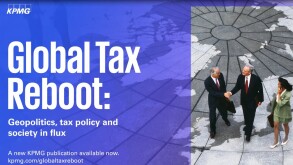CEOs recognise complex tax challenges as top risk to growth
Tax risk and the related business considerations have been slowly moving up the leadership agenda in recent years ― in the most recent KPMG CEO Outlook pulse check, tax moved up to number two in the list of barriers to growth identified by CEOs. This trend was especially prevalent among French, German, Japanese and US companies.
My view is that the concerns stem from a confluence of factors. The impending potential reform in the US, the uncertain global taxation environment, especially in light of still unresolved issues surrounding the taxation of digital companies, the likelihood of the EU legislating country-by-country transparency, new cross border taxes to capture carbon leakage and the likely increase in taxes as COVID-19 stimulus tapers (as evidenced in the UK), all combine to create a complex environment with which CEOs need to grapple.
My view is that while higher taxes will of course increase the cost of capital and therefore may stymie marginal capital projects as businesses make investment decisions, companies that can successfully navigate the increased uncertainty will outperform their competitors and mitigate the tax risks that could otherwise stymie growth.
From January 29 to March 4 2021, 500 CEOs in 11 key markets (Australia, Canada, China, France, Germany, India, Italy, Japan, Spain, UK and US) were asked to provide their three-year outlook on the economic and business landscape, as well as the ongoing COVID-19 pandemic, as captured in the recently released KPMG CEO Outlook Pulse Survey. Respondents have annual revenues greater than $500 million, and a third of companies surveyed have more than $10 billion. in annual revenue.

KPMG research finds that CEOs are preparing for the new normal, including in terms of the level of emphasis they place on the tax function’s role in the successful pursuit of organisational goals. According to the 2021 Pulse Survey, CEOs ranked tax risk as the second greatest threat to growth over the next three years (14%), surpassed only by cyber security risk (18%).
Interestingly, this focus on tax is markedly higher than recent years, with only 5% of CEOs identifying it as a top risk in 2018, less than 1% in 2019, and only 4% highlighting this a risk area of primary concern in 2020. For years, KPMG tax leaders have posited that this is an issue that needs to be higher up on the executive team’s radar. Now, it is decidedly there.
A complex tax environment
The election of the Biden administration has raised an expectation of an increased corporate tax rate (up to 28% in accordance with Biden policy announcements) and an increase in the alternative minimum tax. Moreover, the UK government announced an increase in the corporate tax rate to 25% from 2023 onwards, while other governments consider increases in taxes to pay for COVID-19 stimulus measures.
For the foreseeable future, the disposition of governments is likely to see increased taxes, although many are supplementing with increased investment allowances and R&D concessions to spur investment. Navigating potential tax reform and accessing the full extent of possible concessions will allow business to calculate and manage the cost of capital on their major projects to drive growth.
At the same time there is uncertainty over the resolution of the taxation of the digital economy. The recent letter from Treasury Secretary Janet Yellen to G20 Finance Ministers on the need of international cooperation has given renewed impetus to an agreement in July 2021. That agreement, if based on current proposals, would create new international tax allocation rules not just for automated digital services, but for consumer facing businesses as well.
We have always maintained a multilateral agreement is clearly preferable to the imposition of separate digital services taxes as evidenced by the French position and the EU discussion now occurring. There are also proposals for the creation of global minimum taxation. Whilst the OECD and G20 are looking for mechanisms to simplify the framework, businesses note the significant compliance costs associated with this measure as well as for new rules associated with digital services.

In addition, many companies are expecting a more aggressive stance from revenue authorities in response to the revenue shortfall brought about by COVID-19. Indeed, COVID-19 itself has given rise to an increase in tax risk in particular areas. For example, where employees are working 'cross border' due to COVID-19 restrictions there is additional risk of the creation of a taxable permanent establishment arising in the place where the employee is located. While some revenue authorities have given this a low priority, for others it has become an important area of focus.
In terms of other risks to growth identified by CEOs in 2021, tax also features strongly in the vast majority of other risk areas too.
Consider, for example, the third-ranked 'regulatory risk', and the wealth of tax liabilities arising from increasingly complex cross-border regulations and the general rise in new unilateral regulations. Similarly, 'supply chain risk', which CEOs ranked at number four in the list of risks, incorporates significant tax risks as well. Even before the pandemic situation, many organisations had started to transform their supply chain models in response to trade wars and the risks of being deeply tied to a single supplier or location, and this issue intensified in 2020.
As of March 2020, 75% of companies reported supply chain disruptions in the survey conducted by the Institute for Supply Chain Management, and from what I hear from the tax and business leaders I speak to each day, these challenges have not gone away, even as many organisations have taken innovative steps to find new solutions, tap into new suppliers and diversify the value chain. The tax implications are significant.
Reputational and environmental risks likely to rise―together
Reputational, environmental and climate change risk remains a significant focus of CEO’s.
The Council of the EU recently voted for the Portuguese presidency to engage in negotiations with the European Parliament to adopt the proposed directive on public country-by-country reporting by businesses with more than €750 million of consolidated revenue.
Further, I participated in a Responsible Tax Roundtable recently focused on the Carbon Border Adjustment Mechanism (CBAM), which featured both business leaders and voices from academia, government and civil society. The CBAM is not simply a European issue although there was an acknowledgement that the EU was doing the world a great global service by progressing the carbon leakage issue. The complexity of the CBAM was a focus of the discussion including adherence to WTO rules, the calculation of Co2 intensity and certification and the response of other countries. Once again, a complex interplay of issues which is best solved by a multilateral approach.


Tackling tax risk in the new reality
KPMG also performs ongoing research into tax department operations and how they are changing through our Global Tax Department Benchmarking survey. Here, too, tax leaders’ responses point to a rise in the importance of tax risk management on the executive team’s evaluation of the tax department, with 85% of tax leaders indicating that this is a top performance metric in their organisations.
Tax leaders need to connect with their CEOs and other C-suite leaders to keep them regularly briefed on not only tax risks, but also on the role that tax plays in so many of the other issues keeping their executive leadership teams awake at night. But are tax leaders keeping their executives adequately informed? The same study mentioned above indicates that a striking number of tax leaders still update their executive teams on tax issues only on an ad-hoc basis. Increasing the lines of communications with CEOs, executive leadership and boards is key for tax functions in today’s climate. CEOs stand to benefit from inviting their tax leaders to the table more often to ensure that the tax function is engaged in strategic business decisions and that risks are managed holistically and proactively.
What can tax leaders do to help give their CEOs peace of mind?
Leaders can I think do three things to assist the CEO when it comes to tax risk mitigation:
1. Stay across the evolving reform and regulatory framework and ensure that the CEO and other leaders are briefed. The impacts of impending changes on investment decisions will need to be a key focus over the next few years.
2. Seek ongoing engagement with regulators. Regulators that understand the issues faced by business and the ongoing complexity will make better policy decisions and the tax leader can help bring the voice of business to the table.
3. Maintain an appreciation and understanding of the complex environment that business finds itself in, including from an environmental, social and governance (ESG) perspective and across the broader stakeholder environment. Assisting the CEO to manage that complex stakeholder environment is more important than ever.
With the right frameworks in place and with continued discussions between tax leaders and executive leadership, including the CEO, the tax leader can help ensure the right decisions are made within those frameworks, and that risks are managed effectively in the company’s quest for growth.
The tax risk issues are not new, but they are more intense and more pressing than ever. Fortunately, today’s tax leaders are better positioned to lead the way in helping their CEOs to overcome them.
Podcast episode
In this episode David Linke, global head of tax and legal of KPMG International, talks about the top of mind issues for CEOs in the current climate and the resulting implications for tax leaders.
Read the full article on KPMG's website
Follow this link to access KPMG Future of Tax content
































